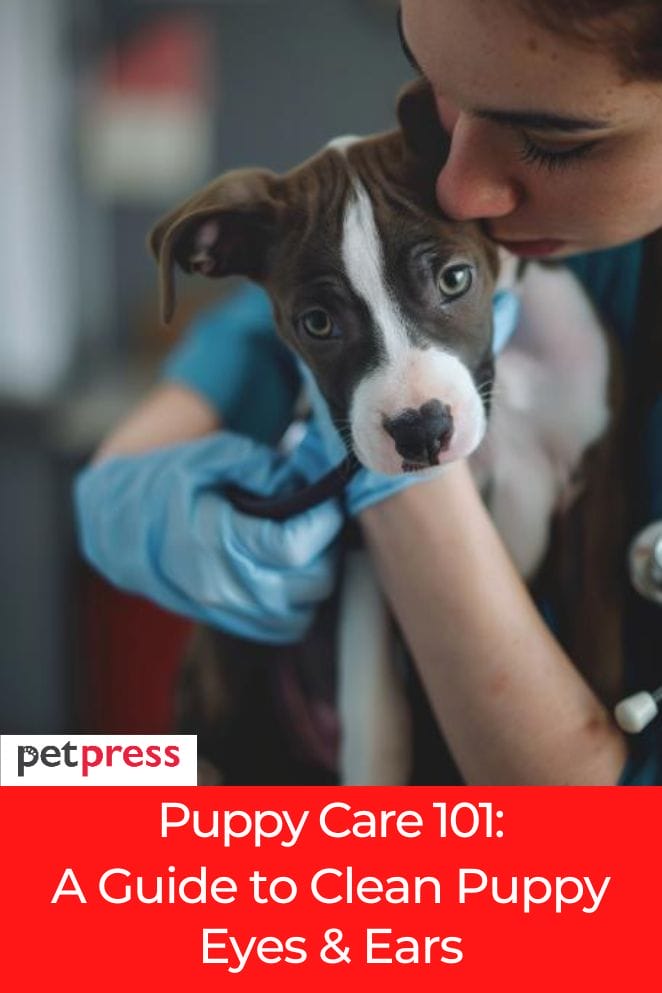
Your puppy’s eyes and ears are essential for their overall health and well-being.
Cleaning these areas regularly can prevent infections, irritation, and discomfort.
In this blog post, we’ll discuss the importance of cleaning puppy eyes and ears, provide a gentle cleaning routine, and address specific problems.
Why Clean Puppy Eyes and Ears?
Cleaning your puppy’s eyes and ears isn’t just about keeping them looking cute – it’s crucial for their health and happiness.
Here’s why:
Preventing infections
Just like humans, puppies can get ear infections.
Regular cleaning removes dirt, wax, and gunk that can attract bacteria and yeast, which are the culprits behind those painful infections.
Think of it like tidying up a room to keep germs away!
Reducing eye irritation
Puppies love exploring, but all that sniffing and playing can lead to irritated eyes from dust, pollen, and other stuff in their environment.
Cleaning their eyes gently removes these irritants, making their peepers feel better and reducing those pesky tear stains.
Early detection of health issues
Cleaning your puppy’s ears and eyes isn’t just about hygiene – it’s a chance to play detective.
By giving them a once-over during cleaning, you can spot any red flags like swelling, discharge, or changes in eye color.
Catching problems early means getting your furry pal the help they need ASAP.
Strengthening your bond
Grooming time isn’t just about getting clean – it’s bonding time!
By handling your puppy gently and rewarding them with treats and praise, you’re building trust and making grooming a positive experience.
Plus, who doesn’t love a good snuggle afterward?
Improved airflow and comfort
Ever had water stuck in your ears after swimming? It’s uncomfortable, right?
Same goes for puppies. Regular ear cleaning helps prevent moisture buildup, which can lead to itching and discomfort.
It also keeps bad smells at bay and ensures proper airflow, so your pup stays happy and healthy.
Preventing ear problems
Nobody wants their puppy dealing with pesky ear mites or painful fly bites.
Regular cleaning helps keep these critters away and ensures your pup’s ear canal stays clear for proper air circulation and drainage.
It’s like giving their ears a little spring cleaning!
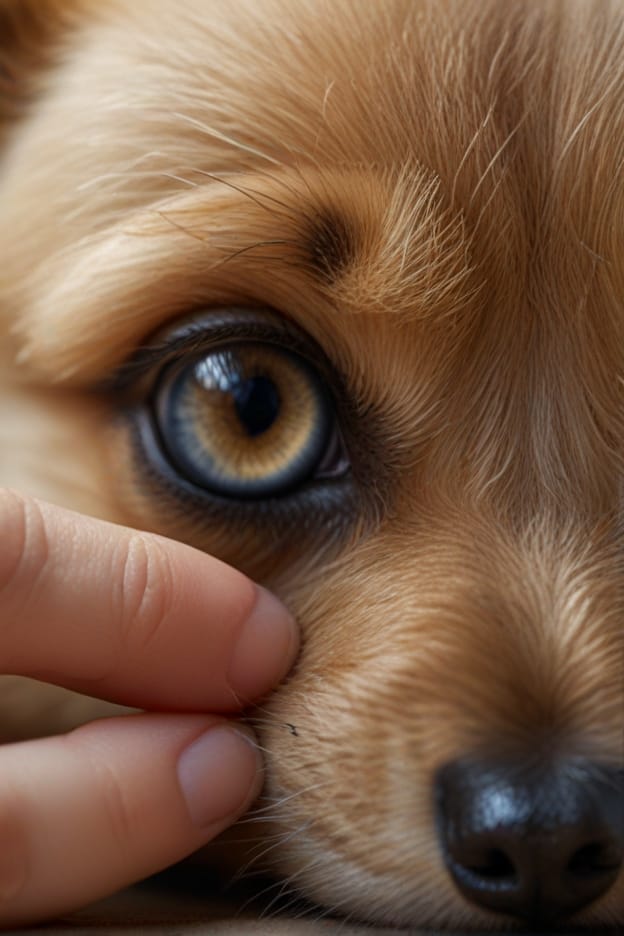
Cleaning Puppy Eyes
Signs of eye problems in puppies
Recognizing signs of eye problems in puppies is crucial for maintaining their ocular health.
Here are some common indicators to watch out for:
Excessive tearing
While some tearing is normal, excessive tearing or constant wetness around the eyes may indicate an issue.
If you notice tears streaming down your puppy’s face frequently, it could signify an underlying problem such as blocked tear ducts or eye irritation.
Redness and swelling
Redness or swelling around the eyes can be indicative of inflammation, infection, or allergic reactions.
Keep an eye out for any changes in the color or appearance of the tissue surrounding the eyes.
Squinting or blinking abnormally
If your puppy is squinting or blinking excessively, it may signal discomfort or pain in the eyes.
This behavior could be caused by various conditions, including injuries, infections, or foreign objects lodged in the eye.
Cloudiness or discharge
Cloudiness in the eyes or the presence of discharge—such as pus, mucus, or crustiness—can indicate infections or other underlying issues.
Healthy eyes should appear clear and free from any discharge.
Rubbing or scratching at the eyes
If your puppy frequently rubs or scratches at their eyes, it could be a sign of irritation, itchiness, or discomfort.
This behavior may worsen the condition and potentially lead to further complications if left unaddressed.
Changes in eye appearance
Keep an eye out for any changes in the appearance of your puppy’s eyes, such as unusual bulging, sunkenness, or changes in pupil size.
These alterations could indicate underlying health issues that require veterinary attention.
Visible third eyelid
The presence of a visible third eyelid or the haw—a membrane that normally rests beneath the lower eyelid—can indicate pain, illness, or eye problems.
If you notice the third eyelid covering a significant portion of the eye, consult your veterinarian promptly.
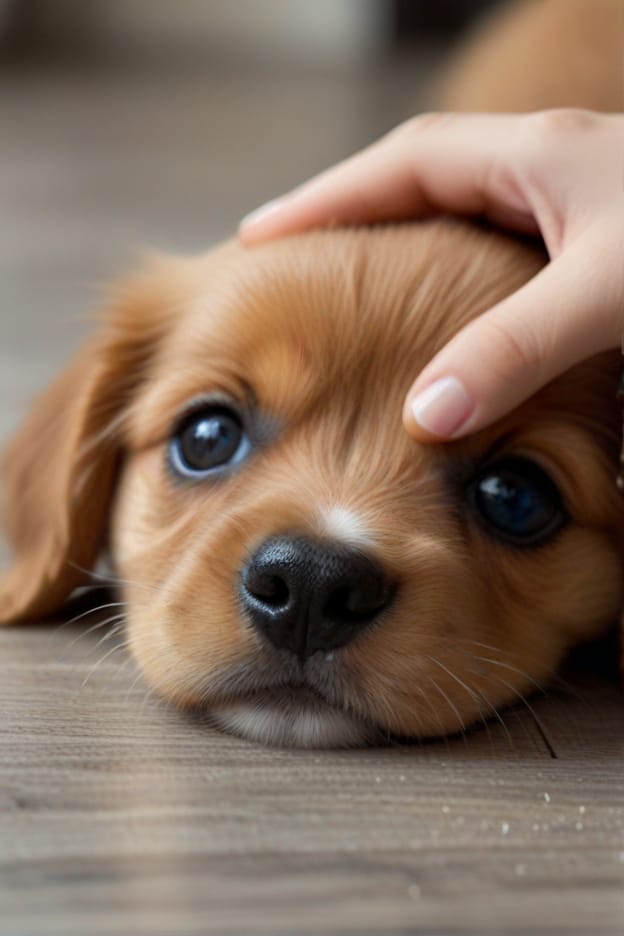
How to clean puppy eyes?
Cleaning your puppy’s eyes may seem daunting at first, but with the right approach, it’s a breeze.
Here’s a detailed guide to help you keep those puppy peepers sparkling clean and healthy:
Gentle cleaning routine
Cleaning your puppy’s eyes doesn’t have to be a daily chore, but it’s essential to do it regularly or as needed.
Here’s how to do it gently:
- Frequency: Aim to clean your puppy’s eyes daily or whenever you notice any gunk or buildup around their eyes.
- Materials: You don’t need fancy equipment – just some warm water and a soft cloth will do the trick.
- Technique: Start by moistening the cloth with warm water or the eye cleaner. Gently hold your puppy’s head steady and wipe their eyes from the inner corner to the outer corner, using a gentle, sweeping motion.
Addressing specific eye problems
Sometimes, your puppy’s eyes might need a little extra attention. Here’s how to deal with common issues:
Tear stains
Those reddish-brown streaks around your puppy’s eyes? They’re tear stains, and they’re totally normal – but nobody likes them.
To remove tear stains, use a gentle tear stain remover specifically formulated for puppies.
Alternatively, you can make a homemade solution by mixing 1/4 teaspoon of hydrogen peroxide with 1/4 cup of water.
Apply the solution to a soft cloth and gently wipe away the tear stains, taking care to avoid contact with their eyes.
Allergies
If your puppy’s eyes seem red, watery, or irritated, they might be suffering from allergies.
In this case, it’s best to consult with your veterinarian for appropriate treatment.
They can recommend safe and effective remedies to alleviate your puppy’s symptoms and keep their eyes comfortable.
Bonus: Homemade eye cleaning solution
If you prefer to make your own eye cleaning solution, here’s a simple recipe:
- Mix 1/4 teaspoon of hydrogen peroxide with 1/4 cup of water in a clean container.
- Stir the solution gently until the hydrogen peroxide is fully dissolved.
- Transfer the solution to a clean, empty eye dropper bottle for easy application.
- Label the bottle clearly and store it in a cool, dry place away from direct sunlight.
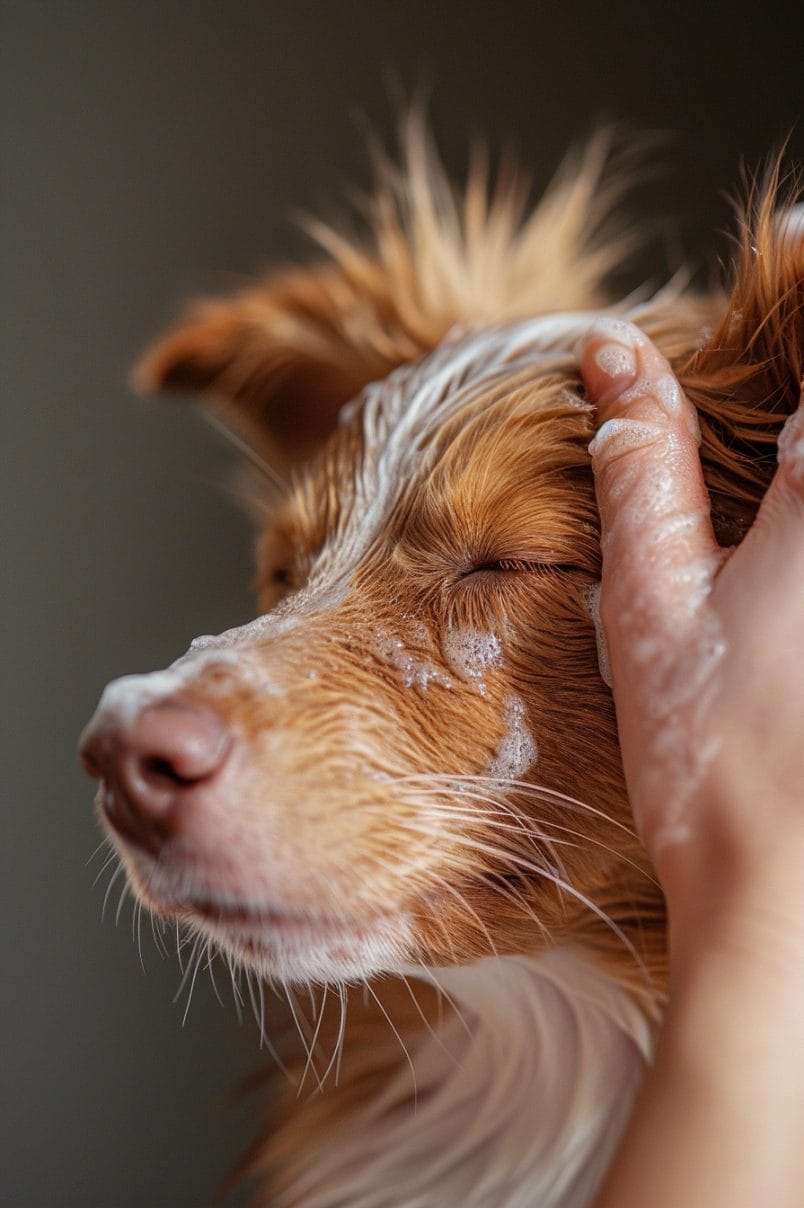
Cleaning Puppy Ears
Recognizing signs of ear infections in puppies
Here are some signs to watch out for that might indicate your pup has an ear infection:
Scratching or pawing at the ear
This is one of the most common signs of an ear infection.
If your puppy is constantly scratching or pawing at their ear, it’s a good indication that something is bothering them.
Head shaking
Excessive head shaking is another telltale sign of an ear infection.
The shaking is an attempt to dislodge whatever is irritating their ear canal.
Redness and swelling of the ear flap
If your puppy’s ear flap is red and swollen, it could be a sign of infection. The ear flap may also feel warm to the touch.
Ear discharge
A discharge from the ear, especially if it is yellow, brown, or bloody, is a strong indicator of an ear infection. The discharge may also have a foul odor.
Loss of balance
In severe cases, an ear infection can affect your puppy’s balance. This is because the inner ear helps with balance, and an infection can disrupt this function.
Hearing loss
In some cases, ear infections can lead to hearing loss.
If you notice that your puppy seems not to be hearing you as well as usual, it’s important to see a veterinarian right away.
How to clean a puppy’s ear?
Maintaining your puppy’s ear hygiene is crucial for preventing infections and discomfort.
Here’s a comprehensive guide on how to safely clean your puppy’s ears:
Safe ear cleaning routine
- Frequency: Aim to clean your puppy’s ears on a weekly basis or as needed, depending on their breed, activity level, and susceptibility to ear issues.
- Materials: You’ll need warm water and a soft cloth or a specially formulated puppy ear cleaner.
- Technique: Begin by gently holding your puppy’s head steady and carefully wiping the outer ear with a soft cloth dampened with warm water or the puppy ear cleaner. Focus on the visible part of the ear, avoiding inserting anything into the ear canal, which can cause injury or discomfort. Use gentle, circular motions to remove any dirt or debris, taking care not to apply excessive pressure.
Breeds with floppy ears (extra care needed)
Certain breeds with floppy ears, such as Basset Hounds, Beagles, Bulldogs, Cocker Spaniels, and Pugs, require extra care when it comes to ear cleaning.
Their floppy ears can create a warm, moist environment that is conducive to bacterial and yeast growth, increasing the risk of ear infections.
Be sure to inspect and clean their ears regularly, paying close attention to any signs of redness, swelling, or odor.
- Check regularly: Keep an eye on your puppy’s ears for signs of redness, swelling, discharge, or a foul odor, as these could indicate an ear infection.
- Gentle cleaning: Clean your puppy’s ears gently and thoroughly, paying extra attention to the folds and creases of their ears where debris can accumulate.
- Dry ears after baths: After giving your puppy a bath, be sure to dry their ears thoroughly to prevent moisture buildup, which can contribute to ear infections.
- Clean toys regularly: Dirty toys can harbor bacteria and yeast, which can transfer to your puppy’s ears during playtime. Clean your puppy’s toys regularly to prevent ear infections.
Bonus: Tips for Preventing Ear Infections
- Regular grooming: In addition to regular ear cleaning, maintaining a consistent grooming routine can help prevent ear infections by keeping your puppy’s coat clean and free of debris.
- Healthy diet: A balanced diet can help support your puppy’s immune system, reducing their risk of developing ear infections.
- Regular vet checkups: Schedule regular checkups with your veterinarian to monitor your puppy’s ear health and address any concerns early on.
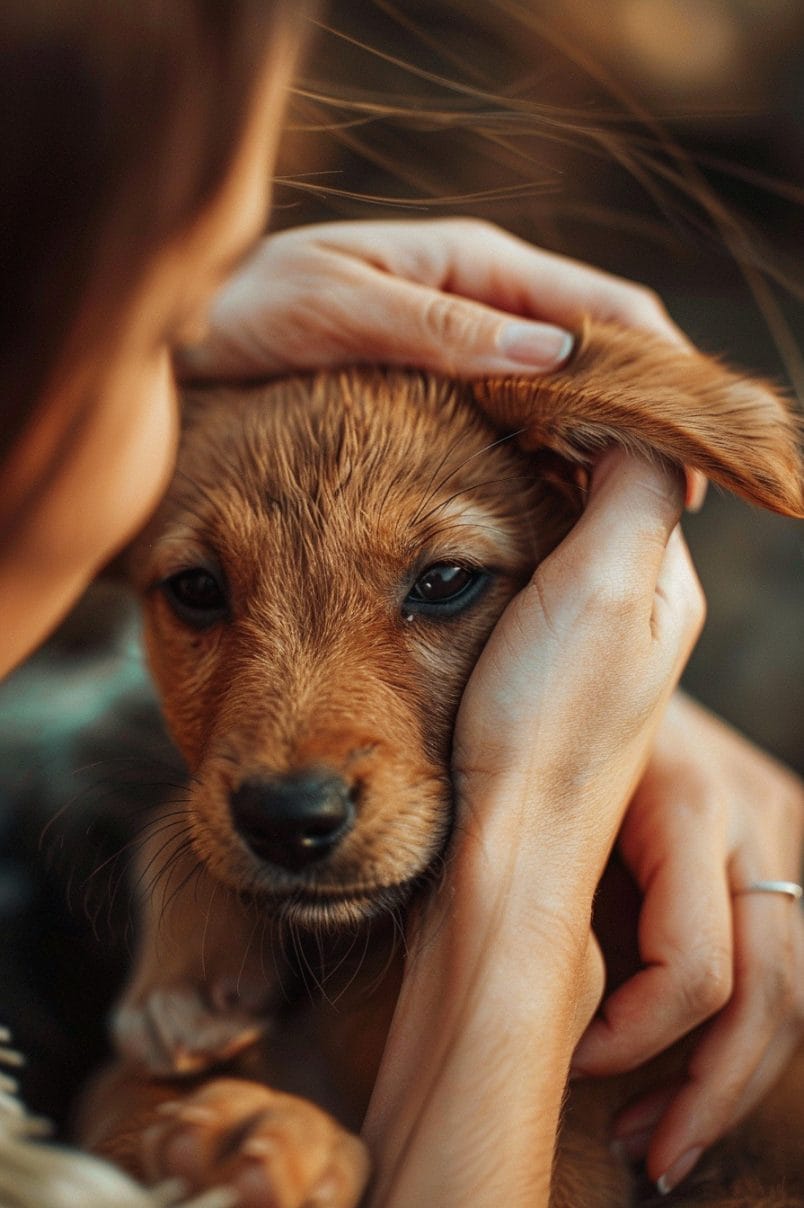
Conclusion
Regularly cleaning your puppy’s eyes and ears is essential for their health and well-being.
By following a gentle cleaning routine and addressing specific problems, you can ensure your puppy stays healthy and comfortable.
FAQs
Clean your puppy’s eyes daily or as needed, and clean their ears weekly or as needed.
Use warm water, a soft cloth, or a puppy eye cleaner for the eyes, and warm water, a soft cloth, or a puppy ear cleaner for the ears.
Dilute hydrogen peroxide with water before using it as a cleaning solution for your puppy’s eyes and ears.
- Does Cat Litter Melt Ice? The Complete Guide to Winter Safety - January 30, 2026
- Happy Tail Dogs: Understanding This Common Canine Condition - January 29, 2026
- How Cold Can Outdoor Cats Handle? Feline Winter Safety - January 27, 2026


GIPHY App Key not set. Please check settings